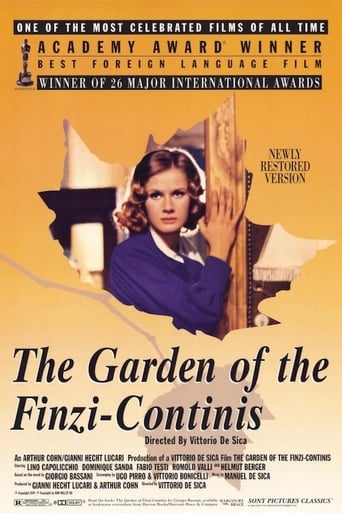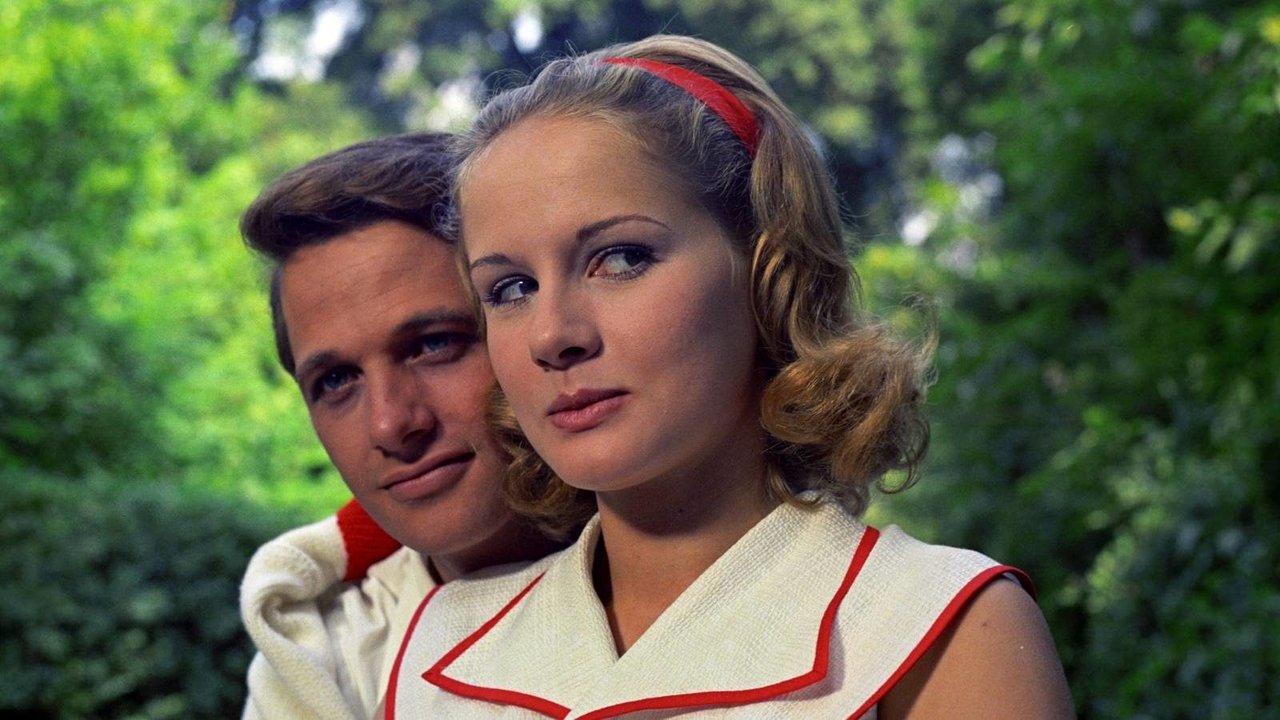nycritic
Much like Louis Malle's similarly themed film from 1987 AU REVOIR, LES ENFANTS, Vittorio daSica's THE GARDEN OF THE FINZI-CONTINI's is a meditative piece on the relatively safe haven of a group of people -- in this case, an entire family of wealthy Jews who enjoy a life of privilege as the horrors of World War II and anti-Semitism rages on. The Finzi-Contini's, however, believe that their position of wealth and their very home will shield them from being touched, and they move on, oblivious to the world outside, in a frozen period of time and space that seems, for a moment, to spare them, until it becomes rather clear that the walls that so protected them are beginning to crumble and that they are headed towards an inevitable train wreck which will destroy all that they know. As their rights and the rights of the Jewish people are stripped away from them, they find themselves suddenly awake into a reality they cannot understand, but must move into. DaSica's movie is a slow-moving lyrical poem which differs from his earlier Neo-Realist work, and captures in its running time this illusionary reality as if all this were a dream that the Finzi-Continis were having. The filtered lens only maximizes the almost enchanted beauty that pours through from the screen and onto the viewers' eyes; indeed, this is nostalgia for a time gone by, a trip down memory lane and a subtle incursion into a denouncement of the horrors of war which never rears its ugly head but whose presence ultimately swallows a family, whole.
jeanserge21
I first heard a radio adaptation from the Garden of the Finzi Contini and afer that read the book. I thought it would be difficult to make an adaptation to cinema. Indeed, the book is above all psychological (or romantic in the literary meaning of the 19th century)i.e the narrator describing his inner world and his sufferings...However, Vittorio de Sica succeeded in expressing this without using monologue, without making a too slow picture... The music is very good too... the images are wonderful...I must correct some commentaries Malnate, Micol's lover is not a fascist but a communist... There is also a difference with the book : in the book we do not know for sure that Micol and Malnate were lovers, it is an assumption whereas it is an evidence in the film...In spite of this differences, this picture deserves a 10 out of 10!
Lee Eisenberg
The Italian people probably felt a moral degradation knowing that their government had participated in exterminating Jews during WWII. "The Garden of the Finzi-Continis" was probably their way of showing that they were atoning for it. It tells of the Jewish Finzi-Contini family in Ferrara in the 1930s. They are a very well off family (with a false sense of security), and many of the people within the family are falling for each other. Unfortunately for them, not even their social status can protect them from the doom that awaits them.Much like in "The Bicycle Thief" over 20 years earlier, Vittorio De Sica shows the desperate existences of a few people, surrounded by what many incorrectly assumed to be a joyful world. Wonderful.
MartinHafer
I liked this film as it approached the holocaust from a completely DIFFERENT direction. Most outside of Italy have no idea about this country's part in the holocaust, but it was quite different from what occurred in Germany. In Italy, Mussolini was supported by Jews and gentiles alike and it was only AFTER the war began that Mussolini began to implement antisemitic laws in order to please Hitler. How he and the people of Italy adopted this was amazing and rather sudden.The movie begins in 1938 and all seems well for the Jewish families portrayed in the movie. Much of the beginning and middle of the movie concerns Giorgio's unrequited infatuation with Micòl Finzi Contini. Although this makes up the bulk of the movie, it is only the background for the more sinister goings on in the country. You see, as the years unfold, more and more restrictions are placed on the Jews and more and more of their rights are eroded. When this first began, the faith of Giorgio's father in their fascist government is unwavering--Mussolini is STILL his hero. However, as the movie continues, his optimism turns to pessimism until he and the Finzi Contini family are rounded up for deportation to the extermination camps by the film's end. Giorgio, it seems has escaped as have other members of his family. However, the exact fate of EVERYONE in the movie (except for Micol's brother) is left uncertain at the conclusion. I liked this, as life, particularly in the case of the holocaust, is far from certain and it seems to work well.


 AD
AD



